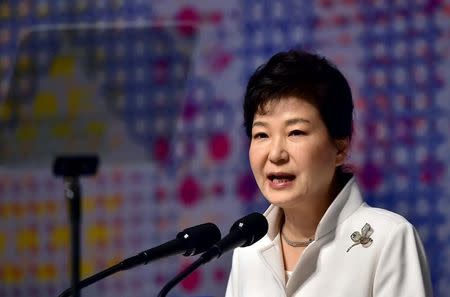Factbox - South Korea Endgame: Options for embattled President Park

SEOUL (Reuters) - South Korean President Park Geun-hye faces mounting calls for her to step down over a political scandal amid indications that parliament, including members of her own ruling party, may try to impeach her. Below are the options facing Park, whose term is due to end in February 2018. RESIGNATION If Park resigns, an election would be held within 60 days with the winner serving five years as Park's successor, making for a high-stakes race for an unexpectedly early presidential vote. The incumbent prime minister would take over until a new president is picked, according to the constitution. IMPEACHMENT To initiate an impeachment, a motion backed by a simple majority of the 300-member parliament is needed. A two-thirds majority vote is need to approve the motion. If passed, the bill would then go to the Constitutional Court for review, where at least six of the nine judges have to approve it. The president's powers would be suspended until the constitutional court ruling, which can take up to six months. If the impeachment motion is confirmed by the court, a new election would be held within 60 days. If an impeachment case is dismissed, Park would be reinstated immediately. PARK SERVES OUT TERM AFTER RELINQUISHING ALL POWER Park may agree with political parties to relinquish all powers in return for remaining in office until the end of her term, while a new prime minister and cabinet appointed by the parliament handle state affairs. There is no precedent to this scenario and political analysts believe Park is unlikely to accept this proposal. PARK IGNORES CALLS TO STEP DOWN Park may declare she will continue serving as president, including representing the country in summit diplomacy. This would likely reignite massive protest rallies. The sitting president cannot be criminally indicted under the constitution unless for treason so she cannot be jailed for her role in the scandal while in office. (Reporting by Ju-min Park and Jack Kim; Editing by Bill Tarrant)

